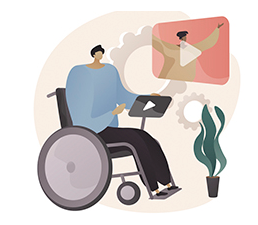Nova Scotia Health strives to provide an environment dedicated to your well-being. We are committed to nurturing not just physical health, but also tranquility of the mind and spirit.

Nova Scotia Health strives to provide an environment dedicated to your well-being. We are committed to nurturing not just physical health, but also tranquility of the mind and spirit.

Hand Hygiene
Washing your hands is one of the most effective ways to stop the spread of infection and disease. There are two acceptable ways to keep your hands clean:
Please read our hand hygiene patient education resource to learn more.
How to Prevent an Infection While in Hospital
Despite the best efforts of health care providers, patients can get infections while seeking health care. (See public reports here) There are some things patients can do to help reduce the chance of getting an infection.
Before you are admitted:
Once you have been admitted:
Once you go home:
Many patients have reduced mobility, sight and hearing. There is an increased risk of falls in the hospital. Family and friends can help reduce the risk of falls. Please remove any obstacles on the way to the bathroom or hallway and make sure the patient’s call bell is within reach.
Safe environment
Help with mobility
Fall risk reduction
Family help
Watch our falls prevention videos HERE
For the protection of your personal property we recommend you bring $25 or less for any small items you may need during your visit. Please leave any valuables at home.
If you must bring something valuable, please remember that Nova Scotia Health Authority is not responsible for any items that go missing from your room or other areas of the hospital.
It is important that your health care providers know about your allergies.
If you wear a MedicAlert or allergy bracelet, make sure your health care providers know about it. Remember to tell the doctors and nurses if you have allergies or have ever had a bad reaction to an anesthetic (medication used to put you to sleep during surgery) or any other drug.
If you have any known drug allergies, you will have to wear a bracelet while in hospital to let staff know. Expect your health care team to check this information often. They may ask you questions about your allergies many times; this is to keep you safe.
You can find our patient safety performance reports here.
February 2025 - The Northern Zone Transportation program is over capacity at this time, and we might not be able to help with every request. Please first look into other...

Ethics Nova Scotia Health provides support to all patients, families, volunteers, staff and health care providers in Nova Scotia Health when they need help making difficult choices or when...

The Access to Technology Consultative Service is for people who are dealing with a health change that makes it more difficult to use their technology. Technology can include a...
Hospice care is a part of palliative care. A hospice residence provides a home-like setting for people who are nearing the end of life, who...
In-home respite provides caregivers with a planned and temporary break from their care giving responsibilities at home. Respite is provided through our contracted home care agencies...
Caregivers often need support to take breaks and continue with their caregiving responsibilities. The Department of Seniors and Long-Term Care funds caregiver programs and services. You...
MAiD is a process where a person who meets a number of criteria is given medications at their request by a qualified health care provider to cause their death.
Canadian...
The music therapy service consists of a team of five accredited music therapists (MTAs) who have been accredited by the Canadian Association for Music Therapists (CAMT).
MTAs use music to...

Palliative care enhances the quality of life of people with a life-limiting illness. It does this by preventing and relieving suffering.

The Palliative Care Bereavement Service offers support to the family and friends of people who were cared for by the Palliative Care Program in Nova Scotia Health (NSH) Central...
The PATH Clinic provides assessment and consultation services to help older individuals and their families understand their true health status and outlook for the future.
The goal of the PATH...
prideHealth supports Two-Spirit, lesbian, gay, bisexual, transgender, queer, questioning, intersex and asexual (2SLGBTQIA+) people by improving their access to safe, coordinated, comprehensive and culturally appropriate primary health care. We support...
We must protect vulnerable adults from negligence, risk and abuse. If you are aware of any such instances, please report it by calling us at 1-800-225-7225...
Protection for Persons in Care provides service for reporting allegations or instances of abuse of individuals in a health care facility.
How do I access the...
The pamphlet describes the importance of hand washing, proper hand washing methods with soap and water, and the use of an alcohol-based hand rub. This pamphlet is also available in French.
Le présent document décrit l’importance du lavage des mains, les méthodes appropriées pour se laver les mains avec de l’eau et du savon ainsi que la façon d’utiliser un désinfectant pour les mains à base d’alcool. This pamphlet is also available in English.